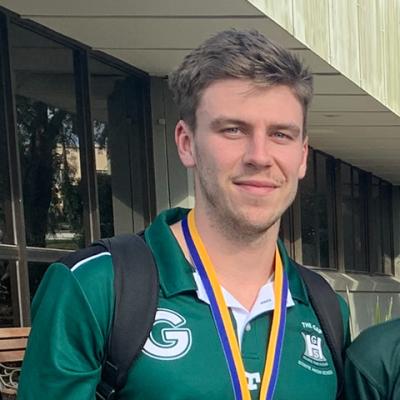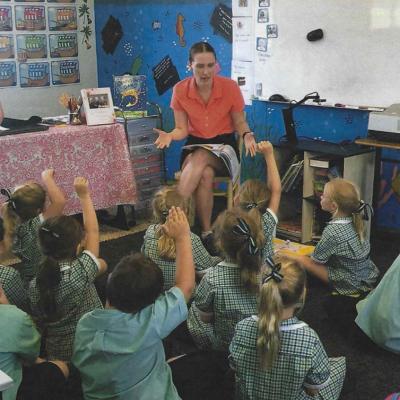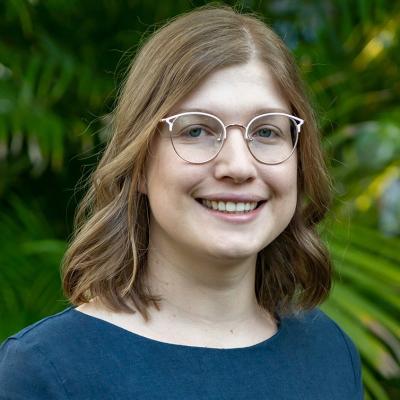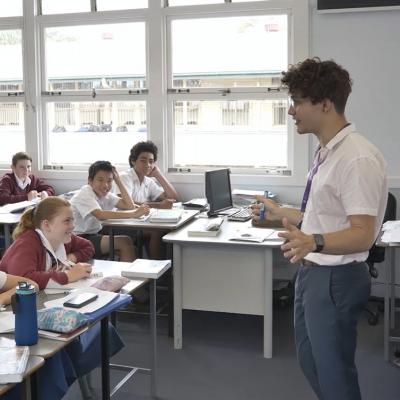So you want to combine your passion for sport, health and teaching by getting into physical education, but you’re unsure where to start.
Becoming a PE teacher isn’t just about being good at sport and good with kids. It’s about learning the theory behind the practice, the strategy involved in teaching and the ways that health and physical education (HPE) can help students grow. Naturally, then, becoming a PE teacher starts with study.
With the help of Nick Reilly, a UQ Bachelor of Health, Sport and Physical Education (Honours) graduate, we'll take you through not only what you need to do to get into PE teaching, but also what will help you land a job, excel at it and continue improving your teaching style over the years.
Let’s begin with the first step towards PE teacher success: tertiary education.
Did you know? The terms PE teacher, HPE teacher and sport teacher are often used interchangeably. The different names can be attributed to the different elements that make up the learning area ‘health and physical education’ – it’s a subject where you learn and develop skills in health, physical activity, and sport.
Study physical education
Types of degrees
There are plenty of universities that offer a standard Bachelor of Education, where you can choose which subject areas you would like to specialise in. However, UQ’s Bachelor of Health, Sport and Physical Education (Honours) is tailored to those wanting to teach PE, health education, science and biology.
“The HPE specific nature of the degree allowed for the inclusion of courses which other teaching degrees do not, covering content which I now use in my day-to-day teaching,” says Nick.
“An example of a course unique to the Bachelor of Health, Sport and Physical Education (Honours) is neuroanatomy, which I now recognise has given me an understanding of how the students I teach are likely to learn best from an anatomical and physiological understanding.”
“Additionally, various honours subjects that I completed encouraged and taught me to view literature with a critical lens, a 21st century research skill I encourage my own students to consider.”
UQ’s Bachelor of Health, Sport and Physical Education is unique in relation to other degrees in this study area, as it’s an honours program. This extra level of in-depth study can help you hone your skills and knowledge, better preparing you for your career as a PE teacher and as a leader in this field.
“The more tools you have at your disposal when you start you career, the more equipped you’ll be to handle the multitude of challenges that may come your way,” says Nick.
Entry requirements
Most university-level studies in teaching require the completion of at least Year 12 level general English and general maths subjects, as well as any prerequisites specific to the program and institution, including meeting the entry score threshold/ATAR cut-off.
There’s also a non-academic entry requirement that must be fulfilled in order to undergo teaching studies. When applying to an education program through QTAC, you will need to complete an online questionnaire that will assess your suitability to teaching.
To do any kind of work with children, you need a current Blue Card issued by the Queensland Government. To get one, you’ll need to undergo a vetting process. Make sure you’re comfortable doing this before you enrol in your university program. You will need a Blue Card before you go on professional experience placements in schools during your studies. Your university faculty will help you arrange one, which is free of charge for students.
What ATAR do you need to be a PE teacher?

Increase your employability
There’s room to build skills in related areas of teaching with a degree in health, sport and physical education.
Graduates of UQ’s Bachelor of Health, Sport and Physical Education (Honours) are qualified to teach:
- Years 7-10 health and physical education
- Years 11-12 physical education
- Years 11-12 health education
- Years 7-10 science
- Years 11-12 biology.
This knowledge of a variety of teaching areas makes UQ health, sport and physical education graduates highly employable.
It’s also important to consider what skills schools are currently looking for in teachers. As new studies are released, approaches to teaching shift and evolve, and staying on top of the latest methodologies will ensure you stand out amongst other graduates.
Nick realised focusing on pedagogy (how you teach), during his studies could increase his employability as many schools are interested in building skills in this area. Learning about pedagogy has also taught him interchangeable skills to allow him to explore different subject areas such as science and maths.
“I felt that my understanding of effective pedagogy, as a result of engaging with courses throughout my degree, set me apart from graduates from other universities when commencing my career.”
Exploring pedagogy has helped Nick to get more out of his career as a PE teacher.
“I enjoy the challenge of implementing effective teaching strategies whilst balancing my students’ individual learning needs,” he says.
“The daily opportunity to strengthen relationships with students and have positive interactions, are part of what makes my job heaps of fun. This rapport with students then, in turn, creates opportunity for deeper learning experiences.”
Make connections
Actively seek out opportunities to build connections within the physical education sphere. This might be with your lecturers and tutors at university, with other teachers while on placement, or in your local community with a sports coach.
“When undertaking practical experiences in university, be as open minded and eager to be involved as possible,” says Nick.
Showing enthusiasm and initiative will naturally help to expand your network, as people will remember your willingness to help out next time an opportunity arises.
You never know what connections may lead to employment, so establishing a network with others in your field is a great way to stay in the loop and increase your chances of landing your dream job after university.
Did you know that UQ Bachelor of Health, Sport and Physical Education (Hons) students have a 100% employment rate?
Get experience
As part of your university studies in physical education, you will undergo professional experience placements, which means you’ll be placed in schools to learn from qualified teachers and develop hands-on skills in the classroom.
“All practical experiences provide an invaluable opportunity to develop teaching skills learnt at university whilst under the guidance of experienced teachers,” says Nick.
He’s a big believer in using your placements to experience an array of school settings – public and private, to work out which may be the best fit for you.
“Different schools provide different challenges and opportunities for development, and as such, having experienced a variety of school demographics will give you knowledge employers are likely to look favourably upon.”
UQ’s Bachelor of Health, Sport and Physical Education (Honours) offers over 100 days of placement throughout 4 years of study. This includes placements in primary, secondary and special needs settings. In the final year, placements are 12 weeks long – an entire term of experience in one school. This is a unique opportunity that makes graduates of this program stand out when seeking employment. Find out more about professional experience placements.
Hone your interpersonal skills
Interpersonal skills are interchangeable skills that can relate to a variety of professions, such as communication and organisational skills.
A PE teacher needs to have both professional and interpersonal skills. You’ll learn professional skills throughout your studies, but you'll develop interpersonal skills in the classroom while on placement, during group assignments and while undertaking any other practical experiences like coaching.
Nick explains that relationship building is essential to being a successful PE teacher.
“Interpersonal skills which allow teachers to have a joke, listen or show compassion and empathy to students are skills which will undoubtedly assist them to do their job effectively.”
“Teaching – HPE teaching in particular – brings with it interruptions, obstacles and challenges,” says Nick.
“Because of this, having an open mind and effective problem-solving skills are part of the necessary skillset for a teacher, as well as being organised and ready for these challenges.”
Want to know more about the types of careers you can pursue with a university degree in health and behavioural sciences or education?






